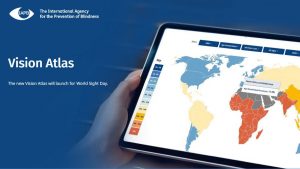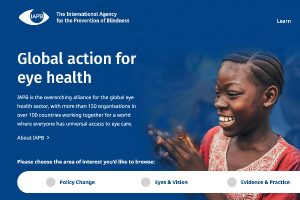Join a powerful, unprecedented alliance for better eye health for all.
Join IAPB-
Choose an alternate language here
2020 marks the end of the Vision 2020 period and the beginning of a new agenda focussing on Integrated People Centred Eye Care/Universal Health Coverage by 2030. Whilst the year has certainly been different to what was expected, it has been a year of transition, considering eye care in the context of a global pandemic and new beginnings in for IAPB Knowledge.
With travel curtailed, highlights of Connecting Knowledge were based on utilising the online environment to connect and share expertise and experiences in a rapidly changing environment for eye health.
Top 3 highlights of 2020 have been:
COVID-19 & Eye Health programme

The COVID-19 & Eye Health web series has been a standout highlight of 2020. Working closely with the communication and Membership Teams and the 39 speakers, we delivered 10 live webinars and 6 recorded interviews which have been viewed (live or recorded by 3922 people). Topics covered include the WHO, UN & IAPB member responses to COVID-19, Technology & innovation, considerations of the pandemic on myopia, diabetes and ageing populations, impact on gender equity and on people with disabilities and a feature web series on Indigenous peoples. We were also able to run 2 French speaking webinars.
The COVID-19 Taskforce Service Delivery group has produced a set of Guiding Principles for service providers and a resource repository of guidelines which will be launching on the digital platform by the end of 2020.

The Atlas provides the 2020 Magnitude and Causes data from the Vision Loss Expert Group, National Indicators against the Global Action Plan. In 2021, it will also have data from the Lancet Global Commission for Eye Health.
A key highlight of working on the Atlas has been working with the global leaders on reference group, Rupert Bourne and the Vision Loss Expert Group, and Matthew Burton & Jacqui Ramke from Lancet Global Commission on Eye Health. A big thank you to everyone involved for your expertise, insights and commitment to making the VA an evidence based, easy to use advocacy and communication tool.
A new digital platform – knowledge hub, events, resource library

Looking to 2021
In 2021 we look forward to beginning the year with the global launch of the Vision Atlas, including data from the LGCEH, at the UN providing Ambassadors a chance to engage with the data from their region and country to initiate/support advocacy efforts. We look forward to working closely with members to utilise the Vision Atlas as a tool for advocacy, communications and learning.
2021 offers an opportunity to further develop relevant, engaging online opportunities for knowledge exchange across the IAPB network. We would love to hear what topics and formats you are interested in engaging with.
Looking forward to working together in 2021!